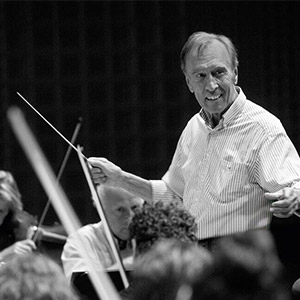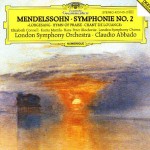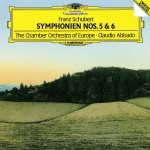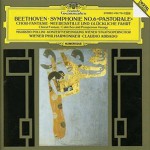
Three favourite Claudio Abbado recordings
The death of Claudio Abbado earlier today marks the passing of an era for me. Along with Herbert von Karajan and Leonard Bernstein, he was one of three celebrated conductors from the Deutsche Grammophon roster who led me on a voyage of musical discovery during my teenage years. Obituaries abound – as already published by Gramophone and the Daily Telegraph – so I will reflect on three of my favourite Abbado recordings.
 The first is not obvious territory for an Italian maestro, although it dates from his years at the helm of the London Symphony Orchestra during an era when conductors ploughed through symphony cycles to create CD boxed sets. Mendelssohn’s Second Symphony, the Hymn of Praise, seemed to me like an undiscovered, alternative Choral Symphony – better in some ways to my younger ears than Beethoven’s Ninth because there was more choral than symphony. In particular, I liked his monumental treatment of the opening brass chorale and the exciting way it returned both at the entrance of the choir and again right at the end of the work.
The first is not obvious territory for an Italian maestro, although it dates from his years at the helm of the London Symphony Orchestra during an era when conductors ploughed through symphony cycles to create CD boxed sets. Mendelssohn’s Second Symphony, the Hymn of Praise, seemed to me like an undiscovered, alternative Choral Symphony – better in some ways to my younger ears than Beethoven’s Ninth because there was more choral than symphony. In particular, I liked his monumental treatment of the opening brass chorale and the exciting way it returned both at the entrance of the choir and again right at the end of the work.
 Freshness characterise not just the orchestral movements of the Hymn of Praise but also my second choice: Schubert’s Fifth Symphony. Abbado recorded it as part of a Schubert cycle with the Chamber Orchestra of Europe. Compared with period orchestral accounts, it lacks the pungency of gut strings and more rustic-sounding woodwinds, yet it is utterly charming and very well played; the bustling opening bars set the tone perfectly.
Freshness characterise not just the orchestral movements of the Hymn of Praise but also my second choice: Schubert’s Fifth Symphony. Abbado recorded it as part of a Schubert cycle with the Chamber Orchestra of Europe. Compared with period orchestral accounts, it lacks the pungency of gut strings and more rustic-sounding woodwinds, yet it is utterly charming and very well played; the bustling opening bars set the tone perfectly.
 My final choice sees him paired with the illustrious pianist Maurizio Pollini. of Beethoven’s Pastoral Symphony with the Vienna Philharmonic mainly for the couplings: the Choral Fantasy – part piano sonata, part piano concerto, part – well, just what do you call a piece that concludes with piano, soloists, chorus and orchestra? Pollini’s playng was suitably aristocratic and the piece ends with a suitably cheerful and emphatic flourish. The recording began with Beethoven’s enigmatic Meerestille und glückliche Fahrt and showed how well Abbado could coax pianissimi from a large choir and orchestra. His account of the Pastoral Symphony was panned by critics, mainly for being too slow as I recall, but I certainly enjoyed all the detail he brought out in the orchestral texture.
My final choice sees him paired with the illustrious pianist Maurizio Pollini. of Beethoven’s Pastoral Symphony with the Vienna Philharmonic mainly for the couplings: the Choral Fantasy – part piano sonata, part piano concerto, part – well, just what do you call a piece that concludes with piano, soloists, chorus and orchestra? Pollini’s playng was suitably aristocratic and the piece ends with a suitably cheerful and emphatic flourish. The recording began with Beethoven’s enigmatic Meerestille und glückliche Fahrt and showed how well Abbado could coax pianissimi from a large choir and orchestra. His account of the Pastoral Symphony was panned by critics, mainly for being too slow as I recall, but I certainly enjoyed all the detail he brought out in the orchestral texture.
If I say that I bought the cassette of his recording during a school French exchange visit to Paris during the 1980s, that dates me somewhat. Unlike Karajan, who died in 1989, Abbado moved well beyond the sounds of my teenage years and went on to embrace the authentic music movement, forming Orchestra Mozart in 2004 to perform with hand-picked like-minded musicians. He surely leaves a huge legacy, both in terms of recordings and the musicians he must have inspired over the decades.

